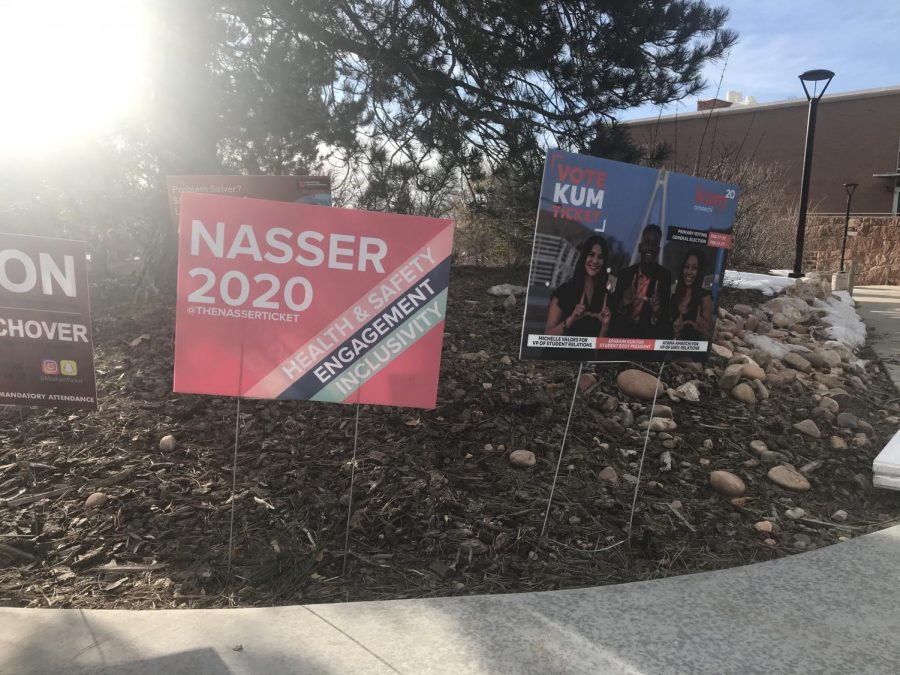ASUU Presidential Tickets Have Different Viewpoints on Funding Campaigns
ASUU presidential campaign signs outside of the Union during the 2020 campaign season. (Photo by Natalie Colby | Daily Utah Chronicle)
February 26, 2020
In campaigning for the ASUU presidency, the three remaining tickets can be reimbursed up to $2,000 for expenses on their campaign.
Candidates use this budget for professional photography and videography for the campaign, posters around campus and other materials, including shirts, buttons and flyers.
At the debate hosted by the Daily Utah Chronicle, the candidates were asked their opinions on this and what they would say to students who might find the amount frivolous.
Rebecca Hardenbrook said that candidates should spend money on sustainable materials that are actually useful and hold town hall events as a cheaper and effective way to engage students.
Ephraim Kum said he was open to lowering the amount and he felt it was a large amount of money. “We should maybe find more creative, cheaper ways to ensure that students still know about what’s going on, and that they can feel encouraged to participate in the elections,” Kum said.
Walker Nasser agreed with Kum in wanting to decrease the amount, but also emphasized the idea of providing financial training for candidates to make sure the money is spent responsibly.
The Nasser and Hardenbrook tickets both said they don’t think there is any rationale behind the amount of money they get.
Many national-level campaigns rely on personal fundraising to pay for their advertising and resources. However, people associated with the Nasser and Hardebrook tickets said they find this idea problematic for university campaigns.
“Personal fundraising is, at least for student elections, a terrible idea all-around. It would allow those students who are higher on the socioeconomic scale to have more success than those who are not. Having publicly funded elections allows people to run on their ideas, not their money,” said Gregory Boisvert, the Nasser ticket campaign manager.
Devon Cantwell, a vice presidential candidate on the Hardenbrook ticket, said at her previous institution, the University of Kansas, campaigns cost around $10,000, and while people tried to fundraise and get business sponsors, often, their families would just write large checks. “If we were to be forced to fundraise instead to run for office, we would have to spend more energy on fundraising than actual governance policy creation and relationship building with students on campus,” Cantwell said. “It’s incredibly detrimental to students when that time has to be divided.”
Boisvert said he felt the money they spent has been beneficial to their campaign, especially the student talent they were able to support through their campaign.
“I’m going to be honest that there likely isn’t much rationale for the amount determined. My experience in two years of working with the finances with ASUU is that few baseline numbers are set with actual historical data taken into account or predictive analytics,” Cantwell said.
“As far as a reasonable amount, we really have no idea. The budgets haven’t changed over the years and a lack of finance training really undermines us giving an assessment that should be taken seriously,” Boisvert said.
Candidates are not the only ones spending money on election season, however. The elections board spends money on voter incentive projects, such as purchasing Chipotle for events and doing “Cocoa and Candidates.”
“Having more diverse candidates — and more candidates in general — will do more to improve voter turnout than the $12,000 of expenses on gimmicks like these,” Cantwell said.
The elections board allocates $12,500 for non-candidate expenses, including inauguration costs and events that promote voter turnout.
If the Hardenbrook ticket is elected, Cantwell said they will work with Audrey Stegman, the elections registrar, to minimize the cost of inauguration, as they feel it is a poor use of student fees. “Reforming the Elections Board to more substantively focus on recruitment, simplifying the elections code and removing barriers to entering the race in the first place will increase engagement with the student political process,” Cantwell said.








